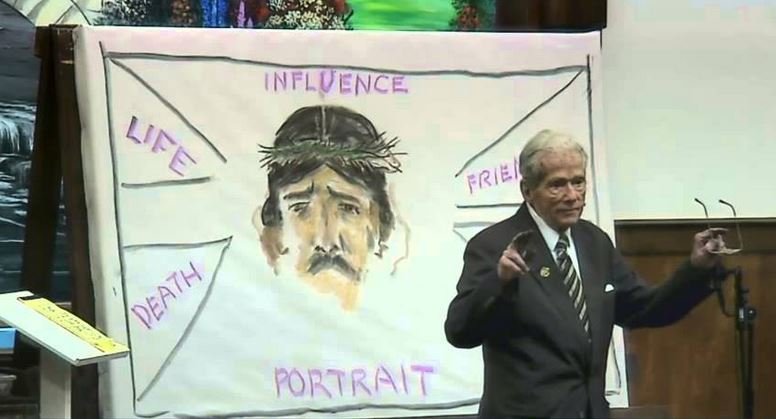
Every year or two, I ask readers to submit questions they want me to answer. That time has arrived once again. Any question. Any subject. Please leave your questions in the comment section or send them to me via email. I will try to answer them in the order received.
I look forward to reading and answering your questions.
Dr. David Tee, whose real name is Derrick Thomas Thiessen, continues to write posts about me and my British friend, Ben Berwick. I have largely ignored him. Thiessen is a rabid Fundamentalist, and at his advanced age, it is unlikely that anything will move him away from Bible literalism and young earth creationism. He is not interested in debate, argument, or discussion. He is convinced that he is one hundred percent right, and that atheists, agnostics, liberal Christians, and other people he deems “unsaved,” are one hundred percent wrong. Thiessen has no room for question, doubt, or nuance. As a true-blue Fundamentalist, everything to him is black and white. So, I no longer try to reason with Thiessen. I have kicked the dust off my sandals and left him to his own devices.
I do, however, want to respond to a post Thiessen wrote yesterday titled I Have a Question. As you will see, Thiessen really doesn’t have any questions to ask me. He just wants to attack my person and besmirch my character. I will be the better man and answer him anyway.
All spelling and grammar in the original.
BG [Bruce Gerencser] may say that we are not banned on his website but we are not going to post there and give him the opportunity to ban us. We will address any information we glean from his website here. That way nothing can be edited or changed on us.
Thiessen is NOT banned from commenting on this site. Any assertion that suggests otherwise is a lie. Thiessen is free to comment any time he wants. I have also offered to debate him. I have even offered to publish a guest post of his. He claims that he is afraid to do so because I might edit or change his words. I have told him several times I will publish exactly what he writes — unedited. I will even leave his misspellings and grammar errors as is. Come on Derrick, time to man up.
Currently, he has this annual theme where he allows his readers to ask him any question they want. it goes under the same title heading above – I have a question- and I guess he selects the ones he will answer.
Note that Thiessen tries to suggest that I pick and choose which questions to answer. This, of course, is untrue. I answer every question I receive, even from him and his bunkmate Revival Fires.
Question One: Why does a guy with nothing to offer keep posting ‘his’ story which hasn’t changed in 10 or 11 years?
As you can see, Thiessen makes a value judgment: a guy with nothing to offer. I am a guy who has nothing to offer closed-minded Fundamentalists like him. It seems thousands of other people disagree with him; people who found value and support from my writing. I know my work is not for everyone, so why doesn’t Thiessen stop reading it and mosey on his way? If certain foods constipate you or aggravate your hemorrhoids, change your diet. Instead, Derrick would rather bitch about how much his anus hurts.
I suspect I have a lot more of my story to tell, even from my Christian days. Unlike Thiessen, my life continues to move forward, and as I continue to walk this path called life, I will have new and varied experiences. And when I do, I will write about them. I am a story-teller, Thiessen is not. He chooses, instead, to preach, teach, and rage. And that’s fine, but there’s no reason for him to criticize me for choosing a different path.
My story is not the only subject for my writing. I write about sports, politics, humanism, atheism, cooking, chronic illness, chronic pain, the Independent Fundamentalist Baptist (IFB) church movement, Evangelicalism, and a plethora of other subjects. And even if I did ONLY write about my story, what’s wrong with that? Every blog has a niche, Thiessen’s included.
His previous answer to us was ‘he wanted people to know his story’. Yet, he could have done that in one website page or one post. However, he keeps repeating the same thing over and over, and over, as if no one has read it before.
I have explained this to Thiessen several times, so I can only conclude that he is being deliberately obtuse. A majority of readers on any given day are new. They don’t know my story, so as a good writer, I believe it is incumbent upon me to share with them who I am, who I was, what I believe, and where I’m headed. Yes, regular readers know my story, but most first-time readers don’t. I make no apology for making sure people know my storyline.
Thiessen shares nothing about his past and present life. He hides from accountability and responsibility in the Philippines, not letting anyone see and know the man he really is. Again, this is his choice, but I shouldn’t be faulted for choosing another path.
Thiessen must live a boring, uneventful life if it fits on a single website page or blog post. I have had an interesting life, filled with all sorts of experiences. Take my short stories series. I am sitting on over a hundred short story draft posts I have not published. I enjoy telling stories, and I plan to tell a lot more of them in the months and years ahead. Hopefully, many of these stories will be published in book form.
The obvious answer is that he is a narcissist and wants everyone to think he is a victim. His continuous reference to ‘his story’ makes his content useless, boring, and out of touch. He needs the attention.
Now Thiessen makes things personal, asserting without evidence that I am a narcissist and a victim. I will leave it to others to decide whether I am a narcissist, but as far as being a victim is concerned, I have faced a lot of trauma in my life. In a clinical sense, I am a victim, a survivor. Should I ignore these experiences in my life? I choose to use them to fuel my passion and help other people. My therapist tells me that my continued writing is essential to managing my depression.
Thiessen expresses his feelings when he says my writing is useless, boring, and out of touch. He is entitled to his opinions, but my email inbox and social media messages suggest that a lot of people find my work useful, engaging, and relevant. That Thiessen doesn’t is his problem, not mine.
Question Two: Why does he keep beating a dead horse?
The “dead horse” Thiessen speaks of is any subject I write about that he disagrees with. Talk about the pot calling the kettle black. Thiessen writes about the same subjects over, and over, and over. Again, he is free to do so. But why is Thiessen so obsessed with policing the content on another creator’s website. This would be like me telling the writers at Science-Based Medicine that they are beating a dead horse. All they talk about is science and medicine. Duh, right. I read their writing because it especially deals with these subjects. I don’t go to their site to find information on Evangelical Christianity. They have a wheelhouse, as do I. I talk about what I know. Too bad Thiessen doesn’t do the same.
Question Three: Why do you continually make yourself look bad?
This is a question about his black-collar series. As we have talked about this before, it does not make BG look like a saint for his reporting of these arrests. Actually, it makes him look bad as he piles on those unfortunate souls as well as rubbing it in their and their families’ faces.
Those types of postings are not making BG look good. It makes him look like some hate-filled person who does not have an ounce of sympathy, forgiveness, or kindness in him. One reason for that is because he is rifling through law enforcement and news outlet files to get the information LONG AFTER the ‘crimes’ have been committed.
He is not helping anyone but he does look vindictive and mean-spirited in his actions. he also looks void of any love and compassion as love does not rejoice in evil. He is rejoicing as he gets clicks when he posts those articles.
Thiessen has repeatedly objected to the Black Collar Crime Series. He continues to defend criminal preachers, including sexual predators. He prefers that their crimes — which he calls “mistakes” — never see the light of day. He doesn’t want the world to know that Evangelicalism has a huge problem with sexual misconduct — every bit as bad as, if not worse than that of the Roman Catholic Church. (Why I Write The Black Collar Crime Series and Will Continue to Do So Despite Criticism from Evangelicals.)
Thiessen wants me to “care” and “love” these predators. Give me a fucking break. I’ll tell you who I care for: the children they molest and rape; the church women they take sexual advantage of; the teens they seduce and assault; the church people whom they steal from and take advantage of. My care and love is reserved for the victims and the families of predators. The criminals themselves? I want to see them prosecuted to the fullest extent of the law. I want to make sure they never, ever pastor a church or have an opportunity to harm people again.
Thiessen, on the other hand, thinks these perverts should be forgiven and restored to the ministry. How sick is that? I have often wondered why he is so anti-victim. What’s the story behind his support of sexual deviants, while at the same time deriding their victims?
As long as preachers continue preying on innocent, vulnerable children, teens, and adults, I plan to continue publishing the Black Collar Crime Series.
It will be interesting to see what his responses will be. He won’t be allowed to post them here. So hopefully we will get a pingback.
Thiessen refuses to let anyone comment on his blog. He also has disabled his contact page. He is immune from criticism and accountability. Nothing I can do about that.
I have sufficiently answered Thiessen’s comments. I am sure he will object to my answers, which he is free to do. As always, I will leave it to readers to weigh the worthiness and value of my writing. Thiessen not liking it is a badge of honor.
Bruce Gerencser, 68, lives in rural Northwest Ohio with his wife of 47 years. He and his wife have six grown children and sixteen grandchildren. Bruce pastored Evangelical churches for twenty-five years in Ohio, Texas, and Michigan. Bruce left the ministry in 2005, and in 2008 he left Christianity. Bruce is now a humanist and an atheist.
Your comments are welcome and appreciated. All first-time comments are moderated. Please read the commenting rules before commenting.
You can email Bruce via the Contact Form.



